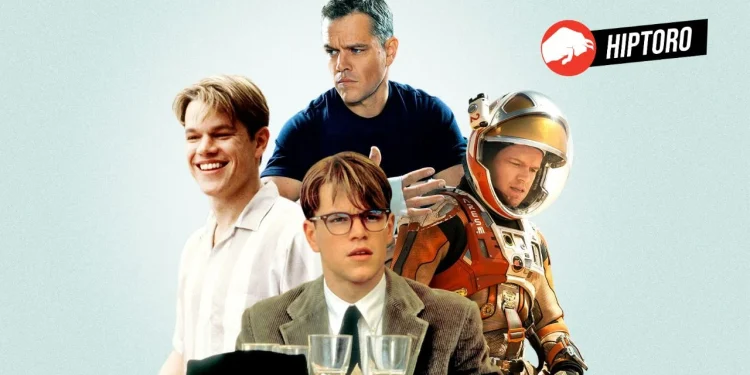Matt Damon, an actor renowned for his versatility and depth, has left an indelible mark on the world of cinema. With a career spanning over two decades, Damon has taken on a wide array of roles that have not only showcased his range as an actor but also his keen ability to select projects that resonate with audiences and critics alike. From action-packed thrillers to poignant dramas, his performances often embody characters that are complex, flawed, and incredibly human, making him one of the most respected and beloved actors of his generation.
The top 10 best movies of Matt Damon reflect a career defined by daring choices and unforgettable performances. Each film on this list not only stands out for Damon’s compelling portrayal of its central character but also for the movie’s impact on audiences and its contribution to the film industry. These movies have become landmarks in cinema, offering stories that entertain, challenge, and inspire.
Through roles that span the spectrum from genius mathematicians and desperate astronauts to gritty warriors and conflicted informants, Damon has proven his ability to dive deep into the essence of his characters, bringing them to life with authenticity and emotional intensity.
Top 10 Best Movies of Matt Damon (Based on Historical Data and Acclaim)
1. Good Will Hunting (1997) – The film catapulted Damon into the spotlight, showcasing his acting prowess and his talent as a screenwriter, which won him an Oscar.
2. The Martian (2015) – A critical and commercial success, demonstrating Damon’s ability to carry a film solo with his portrayal of an astronaut stranded on Mars.
3. The Bourne Identity (2002) – The first in the Bourne series, it redefined the spy genre and became a defining role for Damon.
4. Saving Private Ryan (1998) – A pivotal World War II film directed by Steven Spielberg, featuring Damon in a key role that added depth to the story.
5. Interstellar (2014) – Though not the lead, Damon’s role in this sci-fi epic was memorable, contributing to the film’s complex narrative.
6. Ford v Ferrari (2019) – A biographical drama where Damon plays automotive designer Carroll Shelby, showcasing his range in character portrayal.
7. Ocean’s Eleven (2001) – As part of an ensemble cast, Damon stood out in this heist comedy, proving his comedic timing and versatility.
8. The Departed (2006) – In this gritty crime thriller, Damon’s performance as a mole in the police force highlights his ability to delve into complex characters.
9. The Talented Mr. Ripley (1999) – A film that allowed Damon to explore the darker facets of his acting range, playing a charming yet sociopathic character.
10. Invictus (2009) – Portraying rugby player Francois Pienaar, Damon showcased his ability to take on physically demanding roles and real-life figures.
1. Good Will Hunting: A Timeless Masterpiece (1997)
“Good Will Hunting,” released in 1997, is not just a film but a cultural landmark that resonates with audiences even decades after its debut. Directed by Gus Van Sant and written by Matt Damon and Ben Affleck, the movie explores themes of genius, trauma, and redemption, set against the backdrop of Boston’s working-class neighborhoods.
At its core, “Good Will Hunting” tells the story of Will Hunting (played by Matt Damon), a janitor at the Massachusetts Institute of Technology (MIT) with a prodigious talent in mathematics. Despite his intellectual gifts, Will’s past traumas and present legal troubles prevent him from realizing his potential. His life takes a pivotal turn when he solves a complex math problem that had been left on a chalkboard by Professor Gerald Lambeau (Stellan Skarsgård), leading to an unusual deal: to avoid jail time, Will must study mathematics under Lambeau’s guidance and see a therapist.
Enter Sean Maguire (Robin Williams), a therapist with his own set of past sorrows, who becomes the catalyst for Will’s emotional and intellectual journey. The dynamic between Damon and Williams is electric, with both delivering performances that earned them critical acclaim. Williams, in particular, won an Academy Award for Best Supporting Actor for his role.
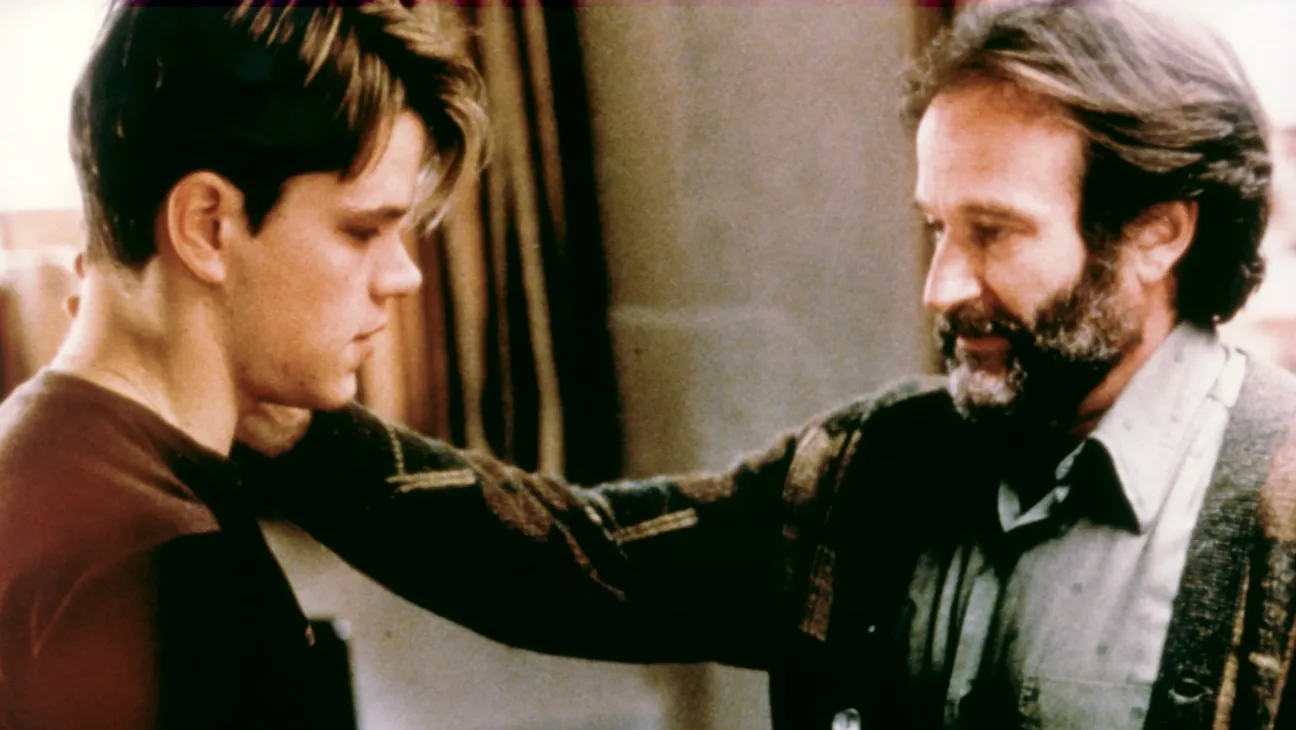
Damon’s portrayal of Will is nuanced and compelling, blending arrogance with vulnerability in a way that feels both real and relatable. The screenplay, rich with witty dialogue and profound monologues, showcases Damon and Affleck’s talent for storytelling, earning them an Oscar for Best Original Screenplay.
The film’s success lies in its ability to balance various elements seamlessly. It’s a love story, as seen in Will’s relationship with Skylar (Minnie Driver), a Harvard student who challenges his defenses. It’s a tale of friendship, highlighted by Will’s bond with his close-knit group of friends, including Affleck’s character, Chuckie. At its heart, it’s a narrative about finding direction and purpose in a world that often seems indifferent to personal pain and loss.
Cinematographically, “Good Will Hunting” captures the essence of Boston, with its gritty exteriors and the stark contrast between the working-class neighborhoods and the academic elitism of institutions like MIT and Harvard. The soundtrack, featuring artists like Elliott Smith, complements the film’s emotional depth, adding to its timeless appeal.

In conclusion, “Good Will Hunting” stands as a testament to the enduring power of storytelling. It’s a film that manages to be both specific in its setting and universal in its themes. Matt Damon’s performance, along with the script, direction, and supporting cast, combines to create a cinematic experience that continues to inspire and resonate with viewers around the world.
2. The Martian: A Tale of Survival and Ingenuity (2015)
“The Martian” begins with astronaut Mark Watney (Matt Damon) being left behind on Mars after his crew mistakenly believes he died during a fierce storm. Alone on a hostile planet, Watney must rely on his ingenuity, knowledge of botany, and engineering skills to survive until he can be rescued. The film expertly balances the tension of Watney’s precarious situation with moments of humor and the human spirit, making for a uniquely uplifting survival story.
Damon’s portrayal of Watney is the heart of the film. His performance captures the astronaut’s resilience, resourcefulness, and unwavering determination to stay alive against all odds. Damon communicates a wide range of emotions, from despair to hope, often with minimal dialogue, conveying his character’s state of mind through physicality and nuanced facial expressions. This performance is a testament to Damon’s versatility as an actor, demonstrating his ability to carry a film’s emotional weight.

One of the film’s strengths is its scientific realism. “The Martian” has been praised for its accurate depiction of Mars’ surface, based on data from NASA, and its portrayal of space travel and survival techniques. This commitment to realism not only educates viewers but also immerses them in the story, making Watney’s journey feel plausible and even more gripping.
The narrative is not just a story of survival but also a celebration of human ingenuity and the collective effort of people across the Earth working together to save one man’s life. The scenes on Earth, featuring a stellar supporting cast including Jessica Chastain, Chiwetel Ejiofor, and Jeff Daniels, depict the global efforts to bring Watney home. These elements highlight the film’s underlying message about the best of humanity: our capacity for problem-solving, cooperation, and compassion.
Ridley Scott’s direction and the cinematography by Dariusz Wolski create a visually stunning depiction of the Martian landscape, which is both beautiful and menacing. The isolation of the red planet is palpable, making Watney’s occasional triumphs all the more exhilarating. The film’s score, composed by Harry Gregson-Williams, further enhances the emotional depth and the sense of wonder and peril inherent in space exploration.
“The Martian” stands out not only as an exceptional science fiction film but also as a poignant human story. It’s a film that celebrates the human spirit, the drive to overcome insurmountable obstacles, and the profound impact of hope. Matt Damon’s performance is central to the film’s success, providing a captivating portrayal of perseverance, humor, and humanity.

With “The Martian,” Damon once again proved his ability to lead a film with both critical and commercial appeal, reinforcing his status as one of Hollywood’s most talented and versatile actors.
3. The Bourne Identity: Redefining the Spy Genre (2002)
“The Bourne Identity” begins with its protagonist, Jason Bourne, being rescued from the Mediterranean Sea with no memory of who he is or how he got there. The only clues to his identity are a bank account number implanted in his hip and an array of extraordinary survival and combat skills he discovers he possesses. As Bourne embarks on a journey to uncover his identity, he navigates a world of espionage, assassins, and a past shrouded in mystery, all while forming a complex relationship with Marie Kreutz (played by Franka Potente), who becomes his ally.
Damon’s portrayal of Bourne is a significant departure from the typical spy characters seen in cinema up to that point. Bourne is not a suave, gadget-reliant figure but a physically capable, deeply human character driven by a need to understand his identity and past. Damon’s intense preparation for the role, including undergoing rigorous physical training and learning multiple forms of martial arts, added a layer of authenticity and excitement to the action sequences. His performance captures Bourne’s vulnerability and determination, making the character relatable despite his extraordinary abilities.
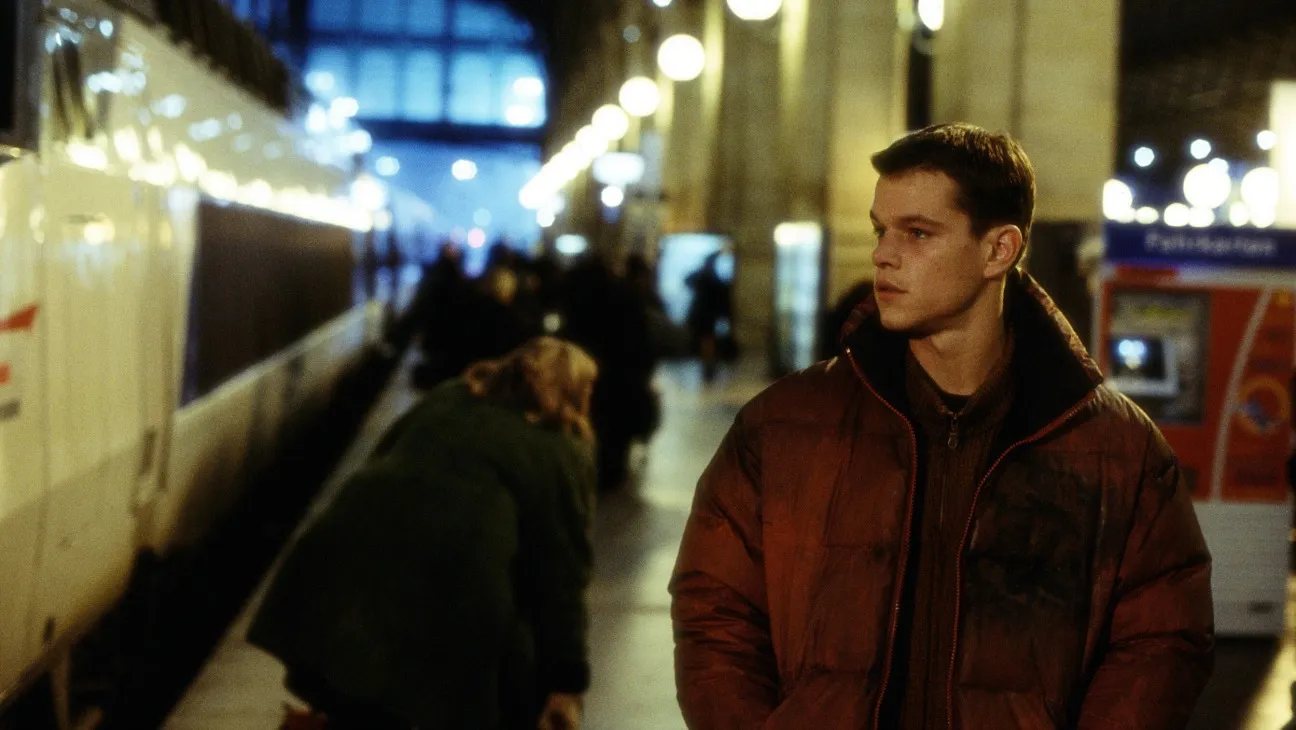
The film’s action sequences, characterized by their realism and innovative choreography, marked a departure from the high-tech, often implausible action scenes prevalent in spy movies of the era. “The Bourne Identity” favored hand-to-hand combat and practical effects, which, combined with Liman’s kinetic directing style, created a sense of immediacy and tension that was both refreshing and invigorating. This approach not only set a new standard for action filmmaking but also influenced a generation of movies and television shows that followed.
The narrative of “The Bourne Identity” is tightly woven, blending Bourne’s quest with broader themes of surveillance, identity, and autonomy. The film critiques the very nature of espionage and the moral ambiguities of those who inhabit that world. This complexity, coupled with Damon’s compelling performance, elevates “The Bourne Identity” above typical genre fare, making it both a critical and commercial success.
The chemistry between Damon and Potente is another highlight, providing an emotional anchor to the story. Their relationship evolves from convenience to genuine care, offering moments of warmth and humanity amidst the surrounding chaos and uncertainty.
“The Bourne Identity” spawned a successful franchise that expanded Bourne’s story across several films, but it’s Damon’s initial portrayal that remains the most impactful. His ability to convey strength, intellect, and vulnerability set a new benchmark for action heroes and remains a defining role in his career.

In essence, “The Bourne Identity” is more than just a spy thriller; it’s a story of self-discovery and redemption, featuring a career-defining performance by Matt Damon. The film’s legacy is evident in its influence on the genre, making it a pivotal film in the early 21st century.
4. “Saving Private Ryan” (1998),
Directed by the legendary Steven Spielberg, is often hailed as one of the greatest war films ever made, and it features Matt Damon in a pivotal role that not only adds depth to the story but also showcases his ability to hold his own amidst an ensemble cast of heavyweights. Set against the brutal backdrop of World War II, the film opens with the harrowing D-Day invasion of Normandy, an unforgettable sequence that sets the tone for a story about sacrifice, honor, and the human cost of war.
Matt Damon as Private James Francis Ryan
Damon plays Private James Francis Ryan, the youngest of four brothers, three of whom have been killed in action within days of each other. The U.S. government, learning of this, decides to send a squad led by Captain John H. Miller (Tom Hanks) to find Ryan and bring him home, as an act of mercy to his grieving mother. Damon’s portrayal of Ryan is both poignant and powerful, capturing the essence of a young soldier torn between his duty to his country and the unimaginable loss his family has endured.
The casting of Damon, then a rising star, added a layer of authenticity and vulnerability to the character of Ryan. His performance resonates with the audience, symbolizing the countless young men who were thrust into the horrors of war, often sacrificing everything for their countries. The scenes featuring Damon, particularly the moment when he learns of his brothers’ deaths, are among the film’s most emotionally impactful, highlighting his ability to convey deep sorrow and resilience.
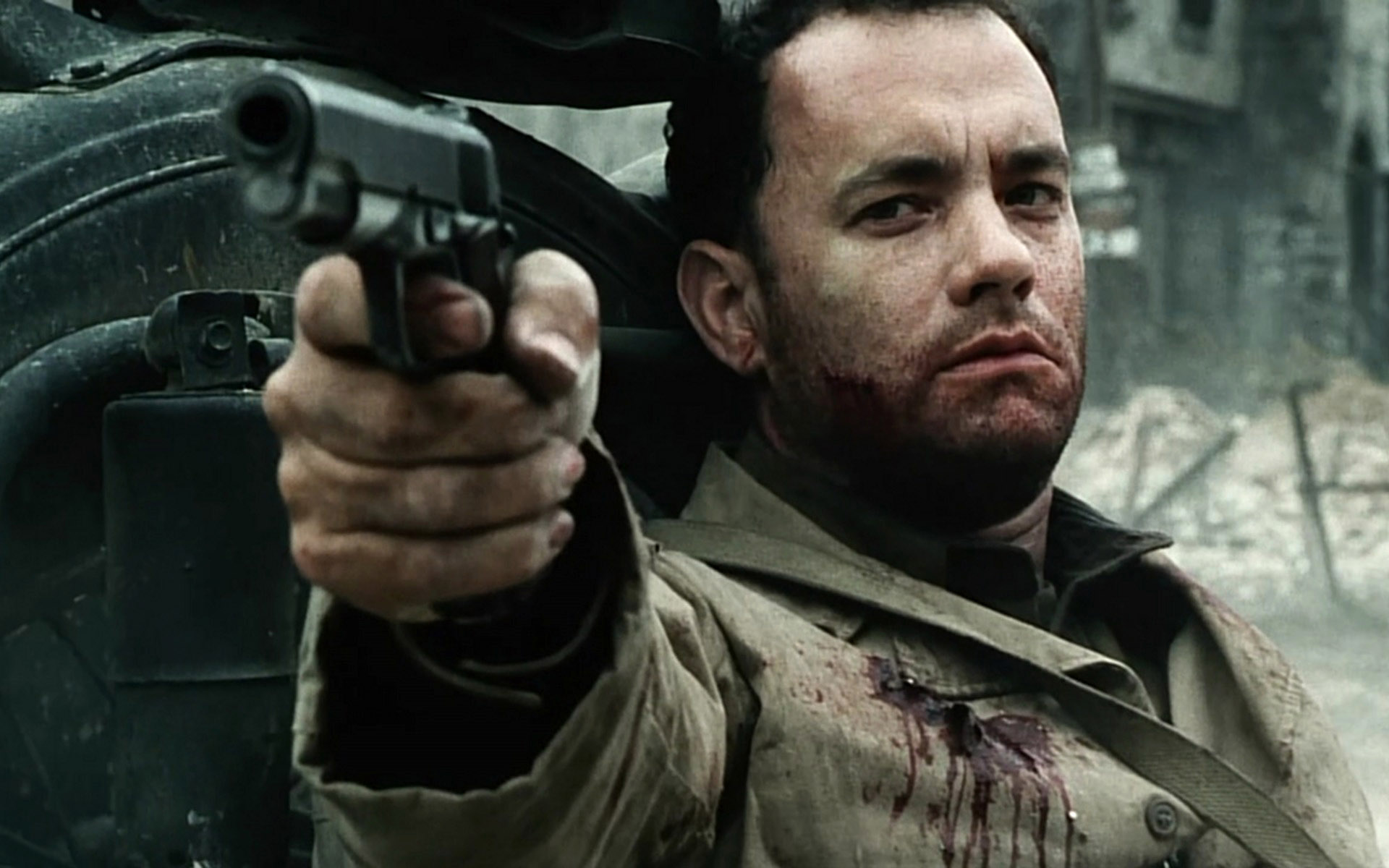
The Impact of “Saving Private Ryan”
“Saving Private Ryan” is renowned for its realistic depiction of warfare, notably the Omaha Beach landing, which is widely regarded as one of the most accurate portrayals of combat ever put on film. Spielberg’s direction, coupled with Janusz Kamiński’s cinematography and the film’s groundbreaking sound design, immerses the audience in the visceral reality of battle, leaving a lasting impact on how war is depicted in cinema.
The film not only solidified Damon’s status as a talented actor capable of handling complex roles but also contributed to a broader conversation about the sacrifices of the Greatest Generation. It sparked discussions on the nature of heroism, the bonds formed in battle, and the personal and collective trauma of war. “Saving Private Ryan” was both a critical and commercial success, earning widespread acclaim and several Academy Awards, including Best Director for Spielberg.
Damon’s Role in the Legacy of “Saving Private Ryan”
Matt Damon’s role in “Saving Private Ryan” is a testament to his versatility as an actor and his ability to bring depth and humanity to his characters. The film itself has become a touchstone in the war genre, remembered not only for its technical achievements and brutal depiction of combat but also for its exploration of moral and ethical questions surrounding war, leadership, and the value of a single life.

Through “Saving Private Ryan,” Damon contributed to a cinematic masterpiece that continues to resonate with audiences around the world, reminding us of the complexities of war and the incalculable cost of human conflict. His performance as Private Ryan stands as a poignant reminder of the personal stories behind the broader strokes of history, cementing the film’s place as a landmark achievement in his career and the annals of film history.
5. “Interstellar, (2014)”
Directed by Christopher Nolan and released in 2014, stands as a monumental film within the science fiction genre, known for its ambitious storytelling, visual splendor, and exploration of complex themes such as love, time, and human survival. While not the lead, Matt Damon’s role as Dr Mann adds a critical layer to the narrative, showcasing Damon’s range as an actor in a film that demands a profound emotional and intellectual engagement from its cast and audience alike.
Interstellar: A Journey Beyond the Stars
“Interstellar” is set in a dystopian future where Earth is becoming uninhabitable due to crop blights and dust storms. The film follows a group of astronauts traveling through a wormhole in search of a new home for humanity. Among the explorers is Cooper (played by Matthew McConaughey), a pilot and engineer, who leaves his family behind to embark on this uncertain journey. The film is renowned for its scientific accuracy, particularly in the portrayal of black holes and time dilation, making it a unique blend of hard science fiction and human drama.
Matt Damon appears in the latter half of the film as Dr. Mann, the leader of a previous mission believed to have found a habitable planet. When Cooper and his team arrive to investigate Mann’s planet, they discover that not all is as it seems. Damon’s performance is pivotal, as his character introduces a significant turning point in the story. Dr. Mann is portrayed as a complex figure, embodying the themes of desperation, survival, and the moral ambiguities faced by humanity in its quest for survival. Damon’s portrayal is nuanced, capturing the depth of Mann’s actions and the psychological turmoil that accompanies the realization of his failure and deceit.
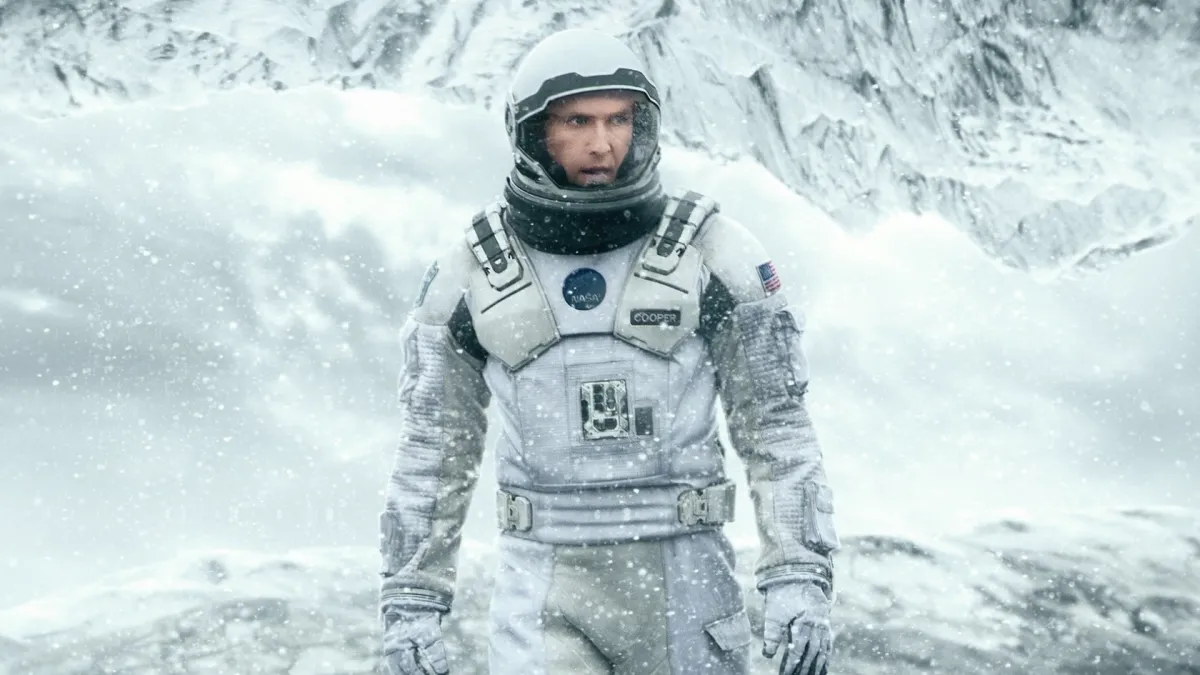
The role of Dr. Mann stands out in Damon’s filmography for its complexity and the moral questions it raises. His portrayal adds to the film’s exploration of the darker aspects of human nature and the extreme behaviors that survival instinct can provoke. Damon’s ability to convey vulnerability and desperation makes Mann’s character both sympathetic and tragic, highlighting the film’s broader themes of human fallibility and redemption.
“Interstellar” itself is a cinematic achievement, blending groundbreaking visual effects with a deeply emotional narrative. Nolan’s direction and the performances of the cast create a compelling story that examines the human spirit’s resilience and the bonds that tie us together across time and space. The film’s depiction of space travel, grounded in theoretical physics, offers a visually stunning and intellectually stimulating experience, while Hans Zimmer’s haunting score amplifies the emotional depth of the narrative.
In a movie filled with powerful performances, Damon’s role as Dr. Mann is a testament to his skill as an actor, demonstrating his ability to take on diverse and challenging roles. His performance contributes to the film’s impact, making “Interstellar” a thought-provoking exploration of humanity’s place in the universe and the lengths to which people will go to preserve it.

“Interstellar” remains a significant work in the realm of science fiction cinema, celebrated for its ambition, scope, and the philosophical questions it poses about our existence and future.
6. “Ford v Ferrari, (2019)”
Directed by James Mangold and released in 2019, is a high-octane drama that dives into the true story of the American automotive designer Carroll Shelby (played by Matt Damon) and the British race car driver Ken Miles (played by Christian Bale). The film chronicles their journey to build a revolutionary race car for Ford Motor Company to challenge Ferrari at the 24 Hours of Le Mans in 1966. This movie not only showcases the thrill of racing but also explores themes of friendship, perseverance, and the corporate interference that often stymies pure creativity and passion.
Ford v Ferrari: A Riveting Tale of Innovation and Determination
At the heart of “Ford v Ferrari” is the partnership between Shelby and Miles, two men who are as different in temperament as they are united in their passion for racing. Matt Damon’s portrayal of Carroll Shelby is characterized by a charismatic resilience and a strategic mind that complements Bale’s fiery portrayal of the unpredictable yet brilliant Ken Miles. Damon delivers a nuanced performance, capturing Shelby’s savvy understanding of both cars and corporate politics, which allows him to navigate the treacherous waters of Ford’s corporate environment while fighting to keep the integrity of his vision for the perfect racing car.
Damon’s Shelby is a man caught between two worlds – the high-stakes corporate boardrooms of Ford and the gritty, adrenaline-fueled environment of car racing. His portrayal is of a man who understands the importance of compromise but is unwilling to sacrifice the heart and soul of his work. This dynamic is most evident in his interactions with Henry Ford II (played by Tracy Letts) and the marketing executive Lee Iacocca (played by Jon Bernthal), where Shelby must balance his creative ambitions with the practical realities of corporate financing and branding.
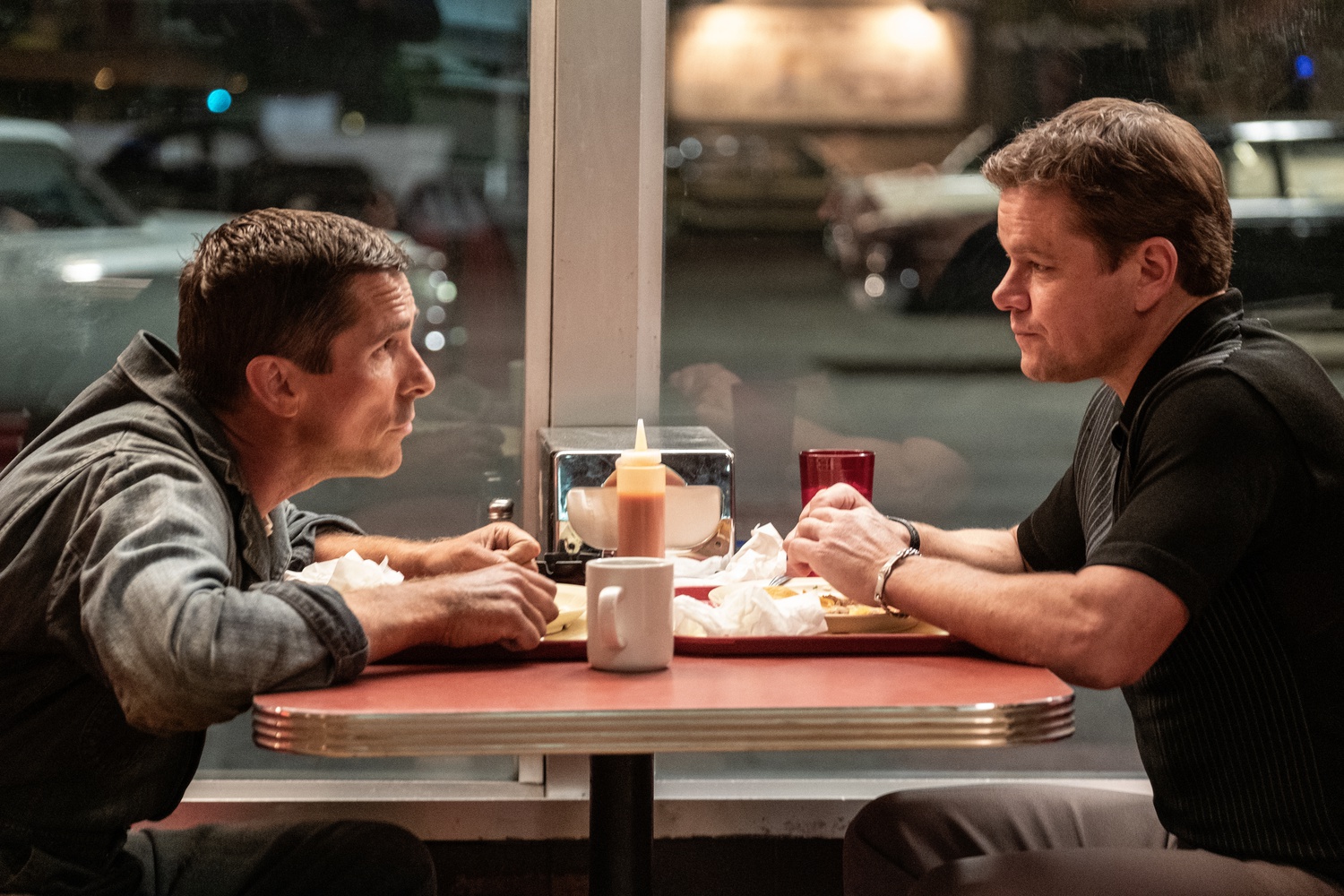
The film shines in its thrilling racing sequences, which are masterfully directed to capture the speed, danger, and excitement of 1960s car racing. However, it is the human story between Shelby and Miles, and their battle against corporate interference, that elevates “Ford v Ferrari” beyond a typical sports movie. The chemistry between Damon and Bale is palpable, showcasing a deep respect and understanding that mirrors the real-life relationship between their characters.
“Ford v Ferrari” is also a visually stunning film, with meticulous attention to period detail that immerses the audience in the 1960s. From the design of the cars to the costumes and the settings, every aspect of the film transports viewers back in time to a pivotal moment in automotive history.
Damon’s performance in “Ford v Ferrari” is a reminder of his versatility as an actor. He brings depth and humanity to Carroll Shelby, making him more than just an automotive designer but a visionary who sees the potential for greatness against all odds. His portrayal is a key component of the film’s success, contributing to its emotional resonance and the gripping narrative that keeps audiences engaged from start to finish.

“Ford v Ferrari” received critical acclaim for its direction, performances, and the way it captures the spirit of innovation and the relentless pursuit of excellence. It’s a testament to the enduring appeal of stories about underdogs taking on seemingly insurmountable challenges, making it a memorable and inspiring film in Damon’s filmography.
7. Ocean’s Eleven: A Heist Film Like No Other (2001)
“Ocean’s Eleven” follows Danny Ocean (Clooney) as he assembles a team of eleven specialists to execute a daring heist of $150 million from three Las Vegas casinos owned by his rival, Terry Benedict (Andy Garcia). Matt Damon plays Linus Caldwell, a skilled pickpocket and con artist who is the rookie of the crew. Linus is eager to prove himself among seasoned criminals and seeks both the thrill of the heist and a sense of belonging in this unconventional family.
Damon’s portrayal of Linus adds a layer of youthful enthusiasm and vulnerability to the film. His character’s journey from being the inexperienced member to playing a crucial role in the heist’s success mirrors the actor’s rise in Hollywood at the time. Damon brings a blend of earnestness and wit to the role, providing comic relief and humanizing moments that balance the film’s slick style and fast-paced plot.
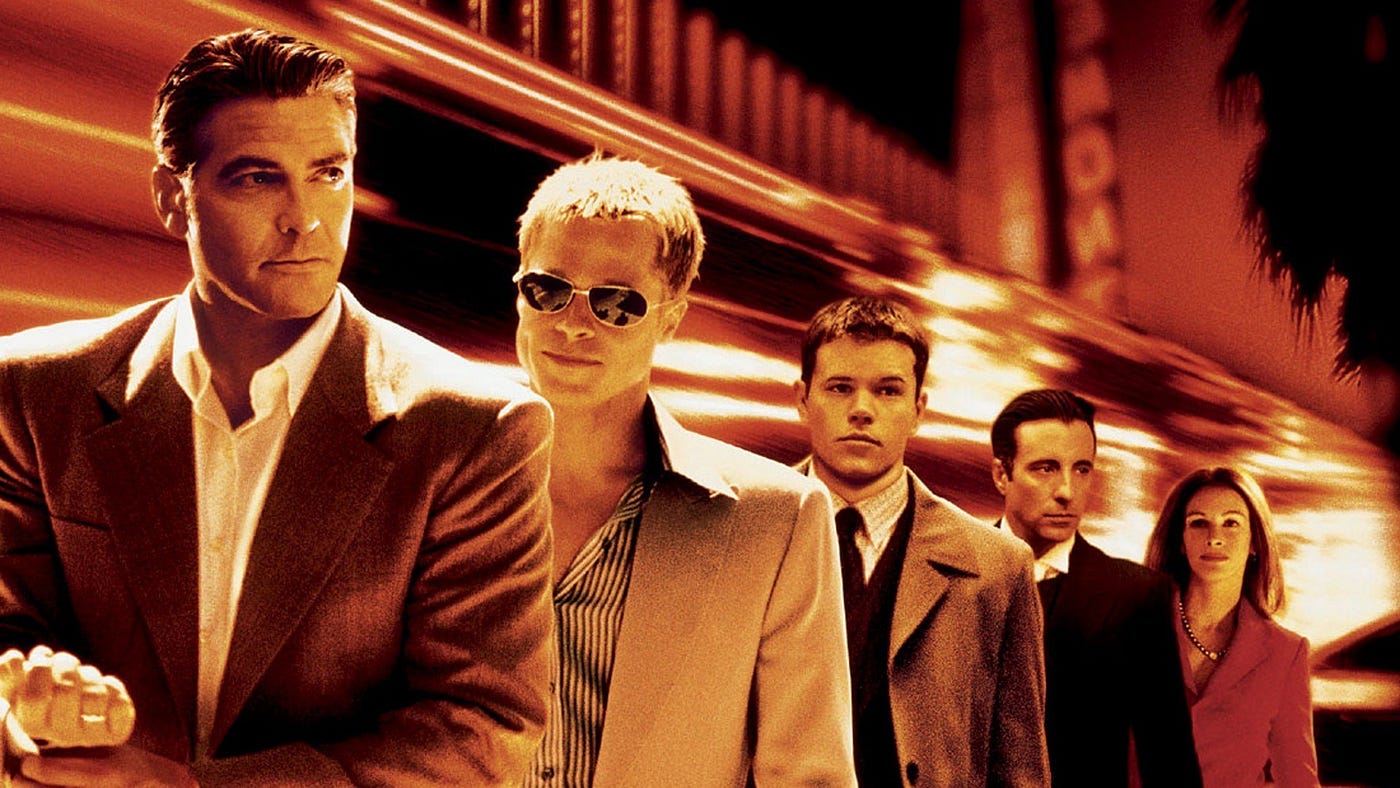
One of the film’s strengths lies in Soderbergh’s direction, which combines smart storytelling, a charismatic cast, and technical finesse to create a heist movie that is as entertaining as it is visually appealing. The chemistry among the cast members, including Damon, is palpable, making the interactions between the characters one of the film’s highlights. This camaraderie contributes significantly to the movie’s charm and the audience’s investment in the characters’ success.
“Ocean’s Eleven” is also notable for its clever script, which weaves together humor, tension, and plot twists seamlessly. The heist itself is intricately planned and executed with precision, keeping viewers engaged and guessing until the very end. The film’s success revitalized the heist genre, leading to several sequels and inspiring a new generation of heist films.
The production design, cinematography, and score further elevate the film, creating an atmosphere that is both glamorous and edgy. The Las Vegas setting, with its glitzy casinos and nightlife, serves as the perfect backdrop for the story, adding to the film’s allure.
In summary, “Ocean’s Eleven” stands out in Matt Damon’s filmography as a project that showcased his ability to blend into a star-studded ensemble while making a significant impact on his performance. His role as Linus Caldwell demonstrates his range as an actor and his capacity for both dramatic and comedic roles. The film itself remains a benchmark for heist movies, celebrated for its wit, style, and the unforgettable performances of its cast, including Damon’s standout portrayal.

“Ocean’s Eleven” not only entertained audiences but also left a lasting impression on the genre, proving that a well-told heist story, combined with a talented cast and creative direction, can create cinematic magic.
8. “The Departed,(2006)”
Directed by Martin Scorsese and released in 2006, is a masterful crime thriller that delves into the complex world of organized crime and undercover operations in Boston. It stands out not only as one of Scorsese’s finest works but also as a highlight in Matt Damon’s career. The film, a remake of the Hong Kong movie “Infernal Affairs,” revolves around two moles infiltrating the Massachusetts State Police and the Irish mob.
Damon plays Colin Sullivan, a state police officer who is secretly working for the mob boss Frank Costello (Jack Nicholson), while Leonardo DiCaprio plays Billy Costigan, an undercover cop infiltrating Costello’s crew. This dual narrative of deception and identity creates a tense, gripping storyline that culminates in a memorable climax.
The Departed: A Tale of Loyalty and Betrayal
Matt Damon’s portrayal of Colin Sullivan is nuanced and compelling. Sullivan is a man torn between the world he has been groomed to infiltrate and protect and his allegiance to Costello, who has been a father figure to him. Damon skillfully conveys Sullivan’s inner conflict and ambition, creating a character that is both despicable and sympathetic. His performance is a testament to his ability to embody complex characters, showcasing a man navigating the precarious balance between his public persona and his secret life.
The film’s strength lies in its exploration of themes such as identity, loyalty, and betrayal, set against the backdrop of the gritty, tension-filled streets of Boston. Scorsese’s direction brings these themes to life with his signature style, combining intense drama with moments of dark humor. The narrative is bolstered by the stellar performances of the cast, including Nicholson, DiCaprio, Mark Wahlberg, and Alec Baldwin, making “The Departed” a powerhouse of acting talent.
Damon’s dynamic with the rest of the cast, particularly his interactions with DiCaprio’s character, adds depth to the film’s exploration of moral ambiguity and the cost of deception. The film cleverly plays with the idea of duality, with Damon and DiCaprio’s characters mirroring each other’s lives in their parallel quests for survival and identity.
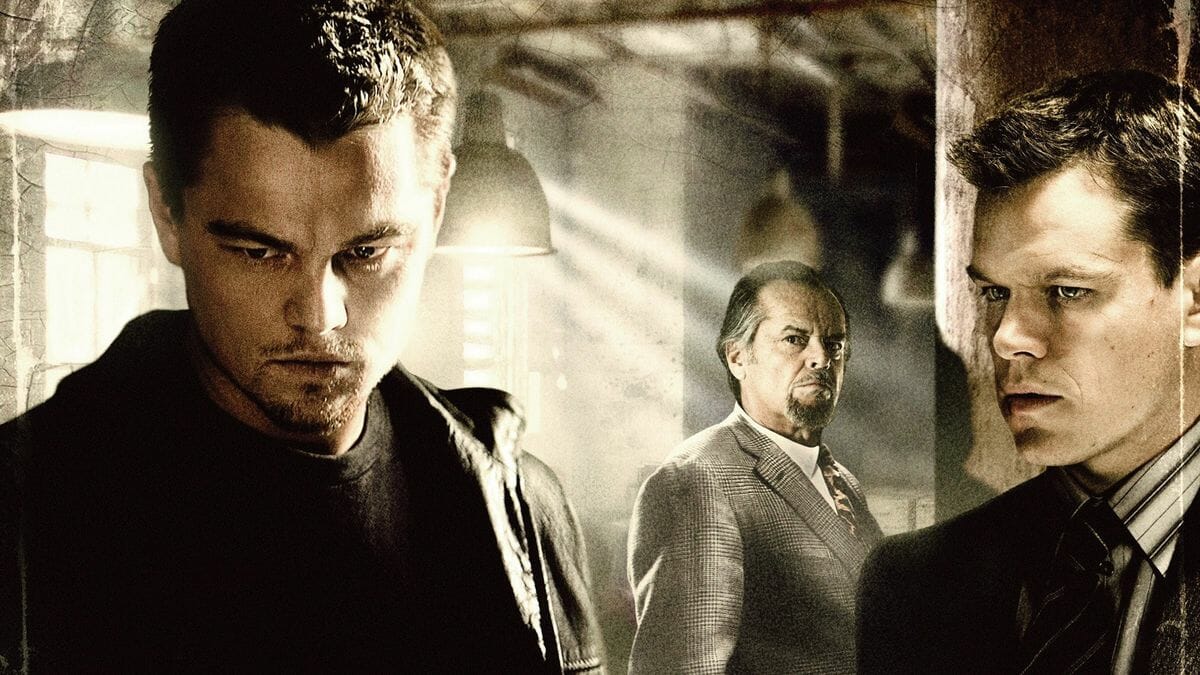
“The Departed” was a critical and commercial success, receiving widespread acclaim for its direction, screenplay, and ensemble cast. It won several Academy Awards, including Best Picture and Best Director for Scorsese, cementing its status as a classic in the crime genre. Damon’s role in the film was a critical part of its success, showcasing his versatility as an actor and his ability to deliver a performance that is both captivating and emotionally resonant.
Beyond the thrilling plot and complex characters, “The Departed” is also notable for its authentic portrayal of Boston, capturing the city’s culture and atmosphere. The film’s use of location, dialect, and music adds to the immersive experience, transporting audiences to the heart of the story’s setting.
In conclusion, “The Departed” stands as a significant work in Matt Damon’s filmography, highlighting his ability to take on challenging roles and contribute to the film’s impact. His portrayal of Colin Sullivan is a reminder of his talent for bringing depth to morally complex characters, making him one of the most respected actors of his generation.

“The Departed” not only entertains but also provokes thought about the nature of identity, loyalty, and the choices that define us. It remains a defining film in the crime genre and a pivotal project in Damon’s career.
9. “The Talented Mr Ripley,”(1999)
Directed by Anthony Minghella and released in 1999, is a psychological thriller that offers a deep dive into themes of identity, obsession, and the dark facets of human nature. Matt Damon stars as Tom Ripley, a character who embodies charm and sociopathy in equal measure.
This film, based on Patricia Highsmith’s novel, is set in the 1950s and follows Ripley’s journey from a New York restroom attendant to a con artist ensconced in the lavish lifestyle of wealthy expatriates in Italy. Ripley’s chilling tale of deceit, murder, and identity theft stands as one of Damon’s most compelling performances, showcasing his ability to navigate complex emotional landscapes and morally ambiguous characters.
The Talented Mr. Ripley: A Study in Envy and Deception
Damon’s portrayal of Tom Ripley is a masterclass in subtlety and intensity. Ripley is a character who longs for the wealth, status, and freedom that comes with the upper-class lifestyle of his acquaintance, Dickie Greenleaf (played by Jude Law), whom he is sent to Italy to persuade back to America. Instead of completing his task, Ripley becomes obsessed with Greenleaf’s life, leading to a dark and twisted plot of deception and murder. Damon captures the nuances of Ripley’s character — his charm, intelligence, and underlying menace — with a performance that is both captivating and disturbing.
The film is visually stunning, with Minghella’s direction and the Italian setting creating a lush backdrop that contrasts sharply with the dark themes explored in the story. The beauty of the Italian landscape, combined with the 1950s setting, adds an element of nostalgia and elegance to the film, which juxtaposes Ripley’s sinister actions and the tension that builds as his lies begin to unravel.
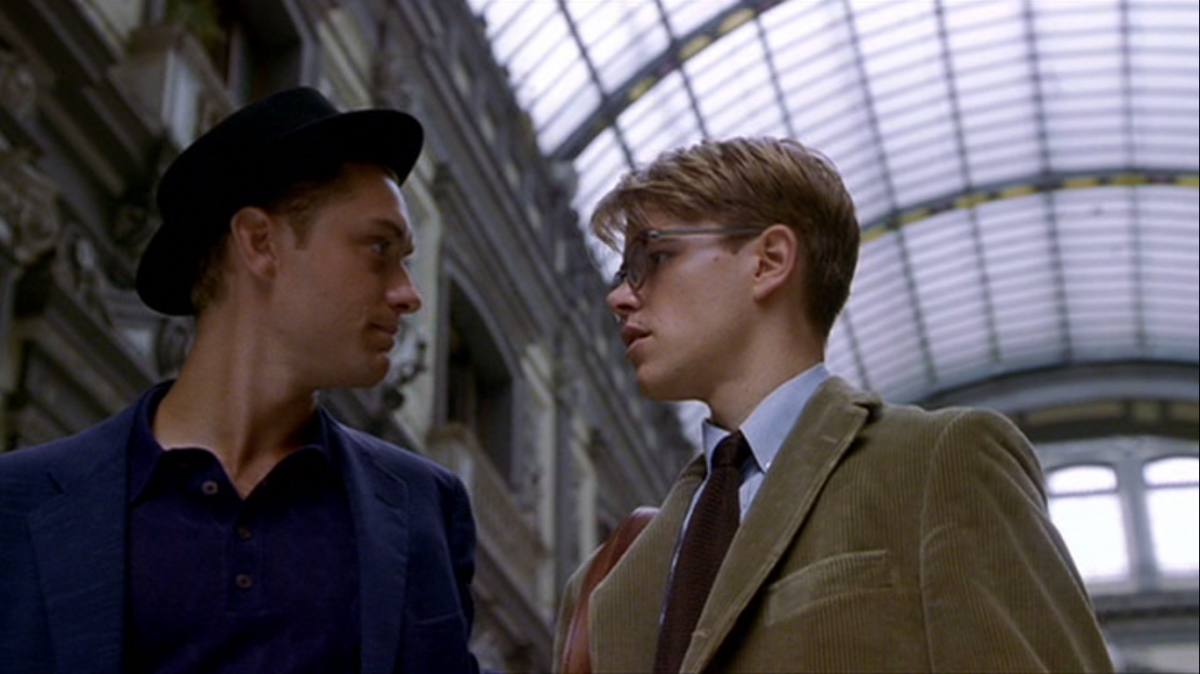
“The Talented Mr. Ripley” is as much a psychological exploration as it is a thriller. It delves into Ripley’s psyche, examining his motivations and the lengths to which he will go to maintain the facade he has constructed. Damon’s ability to evoke sympathy for Ripley, despite his actions, speaks to the complexity of the character and the skill with which he brings him to life. The audience is drawn into Ripley’s world, experiencing his desperation, envy, and fear as he manipulates those around him to preserve his stolen identity.
The supporting cast, including Gwyneth Paltrow, Cate Blanchett, and Philip Seymour Hoffman, deliver strong performances that complement Damon’s and enrich the narrative. Their interactions with Ripley provide insights into his character and the destructive impact of his actions, highlighting the human cost of his deception.
“The Talented Mr. Ripley” received critical acclaim for its direction, screenplay, and performances, particularly Damon’s. The film explores themes of identity, the destructive power of envy, and the human capacity for deceit, making it a compelling and thought-provoking watch. Damon’s transformation into Tom Ripley showcases his range as an actor and his ability to tackle psychologically complex roles, further establishing him as one of his generation’s most versatile talents.

In conclusion, “The Talented Mr. Ripley” is a film that lingers in the mind long after the credits roll, largely due to Matt Damon’s unforgettable performance. It is a testament to his ability to embody deeply flawed characters, making them fascinating and unnervingly relatable. The film remains a standout in Damon’s filmography, illustrating his capacity for bringing depth and nuance to challenging roles.
10. Invictus: A Story of Unity and Inspiration(2009)
“Invictus” offers a glimpse into a pivotal moment in South Africa’s history, when newly elected President Nelson Mandela sought to unite a country divided by decades of racial segregation. Mandela turns to the national rugby team, the Springboks, traditionally seen as a symbol of white oppression, as a means to foster a sense of national unity. Damon’s portrayal of Pienaar is key to this narrative, embodying the transformation of a rugby player into a leader who understands the broader significance of his team’s performance.
Matt Damon’s performance in “Invictus” required him to not only adopt a convincing South African accent but also physically transform himself to portray an international rugby player convincingly. His dedication to the role is evident in his portrayal, capturing Pienaar’s physicality and the weight of the responsibility placed upon him. Damon’s interactions with Freeman’s Mandela are particularly compelling, highlighting the mutual respect and understanding that grows between these two leaders from vastly different worlds.
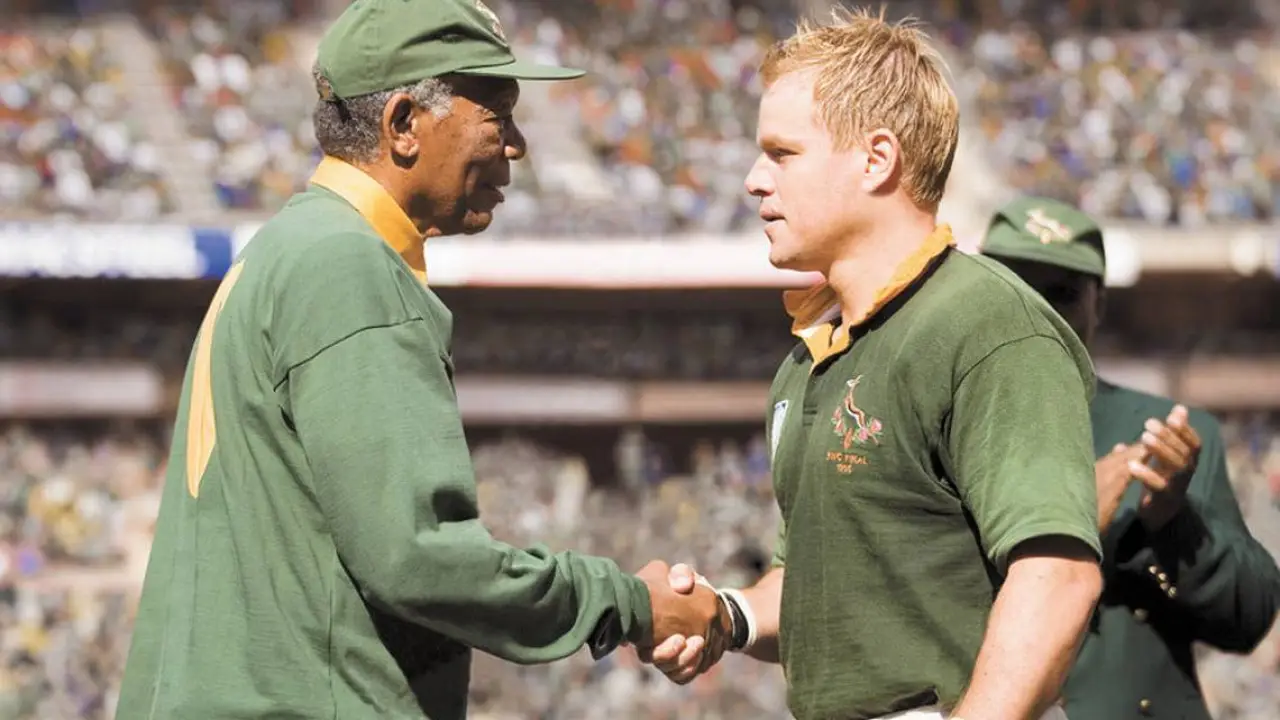
The film beautifully captures the tension and excitement of the Rugby World Cup, making effective use of the sport as a backdrop for exploring themes of leadership, forgiveness, and the power of a united purpose. Eastwood’s direction ensures that the story remains focused on its characters, using the sweeping drama of the tournament as a complement to the personal journeys of Mandela and Pienaar.
“Invictus” stands out for its emotional depth and the historical significance of the events it portrays. The film does not shy away from the complexities of South Africa’s journey towards reconciliation, but it emphasizes the potential for change and the role of empathy in overcoming divisions. Damon’s performance is central to this narrative, offering a nuanced portrayal of a man who comes to understand his role in his country’s healing process.
The film received critical acclaim for its direction, performances, and its inspirational message. Damon’s portrayal of Pienaar earned him an Academy Award nomination for Best Supporting Actor, highlighting his ability to take on challenging roles and deliver powerful performances. “Invictus” is a testament to the impact of sport as a means to bridge divides and the enduring power of hope and unity in the face of adversity.

In conclusion, “Invictus” is a remarkable entry in Matt Damon’s filmography, showcasing his versatility as an actor and his capacity to bring to life characters who inspire and resonate with audiences. His portrayal of Francois Pienaar stands as a powerful reminder of the role of individuals in shaping history and the importance of leadership in times of change.
Matt Damon’s career is marked by a wide range of roles that demonstrate his talent and versatility. From action heroes to complex, morally ambiguous characters, Damon has consistently proven his ability to tackle diverse challenges and deliver memorable performances.
Reflecting on the journey through Matt Damon’s diverse and illustrious career, we’ve traversed a landscape that showcases not only the breadth of his acting prowess but also the depth of his choices in roles. From the cerebral challenges of “Good Will Hunting” and “The Martian” to the physical demands of “The Bourne Identity” and the complex emotional landscapes of “The Talented Mr. Ripley” and “Invictus,” Damon has demonstrated a remarkable capacity to engage, inspire, and provoke thought among audiences worldwide.
The Versatility of Matt Damon
Damon’s career stands as a testament to his versatility as an actor. He has navigated the realms of drama, action, science fiction, and historical narrative with equal finesse, embodying each character with a depth and sincerity that resonates with viewers. Whether portraying an abandoned astronaut fighting for survival, a genius grappling with his past, or a rugby captain embodying a nation’s hopes, Damon brings a nuanced understanding of the human condition to his performances.
A Commitment to Storytelling
Beyond his versatility, Damon’s career reflects a commitment to storytelling. He has consistently chosen projects that not only challenge him as an actor but also contribute to cinema’s power to enlighten, entertain, and inform. His roles often explore themes of identity, resilience, and the capacity for change, inviting audiences to reflect on their own experiences and the world around them.


